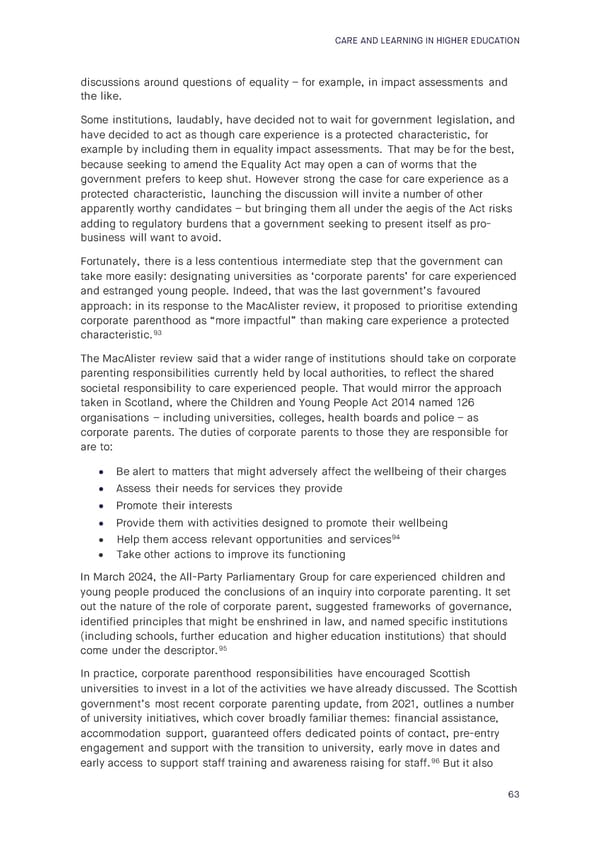CARE AND LEARNING IN HIGHER EDUCATION discussions around questions of equality – for example, in impact assessments and the like. Some institutions, laudably, have decided not to wait for government legislation, and have decided to act as though care experience is a protected characteristic, for example by including them in equality impact assessments. That may be for the best, because seeking to amend the Equality Act may open a can of worms that the government prefers to keep shut. However strong the case for care experience as a protected characteristic, launching the discussion will invite a number of other apparently worthy candidates – but bringing them all under the aegis of the Act risks adding to regulatory burdens that a government seeking to present itself as pro- business will want to avoid. Fortunately, there is a less contentious intermediate step that the government can take more easily: designating universities as ‘corporate parents’ for care experienced and estranged young people. Indeed, that was the last government’s favoured approach: in its response to the MacAlister review, it proposed to prioritise extending corporate parenthood as “more impactful” than making care experience a protected 93 characteristic. The MacAlister review said that a wider range of institutions should take on corporate parenting responsibilities currently held by local authorities, to reflect the shared societal responsibility to care experienced people. That would mirror the approach taken in Scotland, where the Children and Young People Act 2014 named 126 organisations – including universities, colleges, health boards and police – as corporate parents. The duties of corporate parents to those they are responsible for are to: • Be alert to matters that might adversely affect the wellbeing of their charges • Assess their needs for services they provide • Promote their interests • Provide them with activities designed to promote their wellbeing 94 • Help them access relevant opportunities and services • Take other actions to improve its functioning In March 2024, the All-Party Parliamentary Group for care experienced children and young people produced the conclusions of an inquiry into corporate parenting. It set out the nature of the role of corporate parent, suggested frameworks of governance, identified principles that might be enshrined in law, and named specific institutions (including schools, further education and higher education institutions) that should come under the descriptor.95 In practice, corporate parenthood responsibilities have encouraged Scottish universities to invest in a lot of the activities we have already discussed. The Scottish government’s most recent corporate parenting update, from 2021, outlines a number of university initiatives, which cover broadly familiar themes: financial assistance, accommodation support, guaranteed offers dedicated points of contact, pre-entry engagement and support with the transition to university, early move in dates and early access to support staff training and awareness raising for staff.96 But it also 63
 Care and Learning in Higher Education Page 63 Page 65
Care and Learning in Higher Education Page 63 Page 65